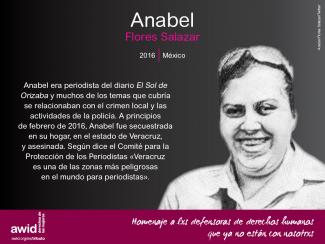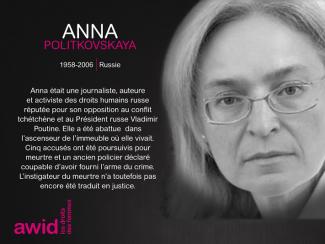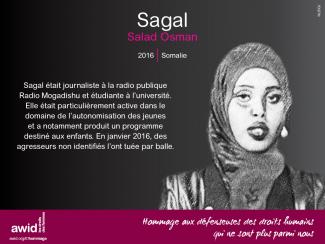
Anabel Flores Salazar

WHRDs are self-identified women and lesbian, bisexual, transgender, queer and intersex (LBTQI) people and others who defend rights and are subject to gender-specific risks and threats due to their human rights work and/or as a direct consequence of their gender identity or sexual orientation.
WHRDs are subject to systematic violence and discrimination due to their identities and unyielding struggles for rights, equality and justice.
The WHRD Program collaborates with international and regional partners as well as the AWID membership to raise awareness about these risks and threats, advocate for feminist and holistic measures of protection and safety, and actively promote a culture of self-care and collective well being in our movements.
WHRDs are exposed to the same types of risks that all other defenders who defend human rights, communities, and the environment face. However, they are also exposed to gender-based violence and gender-specific risks because they challenge existing gender norms within their communities and societies.
We work collaboratively with international and regional networks and our membership
We aim to contribute to a safer world for WHRDs, their families and communities. We believe that action for rights and justice should not put WHRDs at risk; it should be appreciated and celebrated.
Promoting collaboration and coordination among human rights and women’s rights organizations at the international level to strengthen responses concerning safety and wellbeing of WHRDs.
Supporting regional networks of WHRDs and their organizations, such as the Mesoamerican Initiative for WHRDs and the WHRD Middle East and North Africa Coalition, in promoting and strengthening collective action for protection - emphasizing the establishment of solidarity and protection networks, the promotion of self-care, and advocacy and mobilization for the safety of WHRDs;
Increasing the visibility and recognition of WHRDs and their struggles, as well as the risks that they encounter by documenting the attacks that they face, and researching, producing, and disseminating information on their struggles, strategies, and challenges:
Mobilizing urgent responses of international solidarity for WHRDs at risk through our international and regional networks, and our active membership.
جديد
كمشارك/ة عبر الإنترنت، يمكنك توجيه النشاطات والتواصل والتحدث مع الآخرين/ الأخريات وتجربة الإبداع والفن والاحتفال بمنتدى جمعية حقوق المرأة في التنمية بشكل مباشر. سيستمتع المشاركون/ات المتصلون/ات عبر الإنترنت ببرنامج غني ومتنوع، بدءًا من ورشات العمل والنقاشات وحتى نشاطات الاستشفاء والعروض الموسيقية. ستركز بعض الأنشطة على التواصل بين المشاركين/ات عبر الإنترنت، وسيكون البعض الآخر هجينًا بالفعل، يركز على الاتصال والتفاعل بين المشاركين/ات عبر الإنترنت وأولئك الموجودين/ات في بانكوك.
Pour toutes questions liées à l’Appel aux propositions d'activités, merci de nous contacter via notre formulaire de contact en choisissant « Proposition d'activité » comme sujet de votre message.

‘La sexualidad es fluida y en este momento mi vagina también’
#FeministFestival #SextLikeAFeminist
Los actores anti-derechos adoptan una estrategia doble. Además de atacar abiertamente al sistema multilateral, los actores anti-derechos también socavan los derechos humanos desde adentro. Se involucran con el fin de cooptar procesos, consolidar normativas regresivas, y erosionar responsabilidades.

El involucramiento de los actores anti-derechos en espacios internacionales de derechos humanos tiene un objetivo principal: socavar el sistema y su capacidad de respetar, proteger y satisfacer los derechos humanos para todas las personas, y de exigir rendición de cuentas a los Estados miembro por su violación. Algunas tácticas anti-derechos operan por fuera de la ONU, e incluyen la deslegitimación y la presión política para desfinanciar a la ONU, o para que ciertos Estados miembro se retiren de acuerdos internacionales sobre derechos humanos. En los últimos años, algunos actores antiderechos han logrado una creciente influencia dentro de la ONU. Sus tácticas internas incluyen la capacitación de representantes, la distorsión de los marcos de derechos humanos, el debilitamiento de acuerdos sobre derechos humanos, la infiltración en comités de organizaciones no gubernamentales, las solicitudes de ingreso al Consejo Económico y Social bajo nombres neutrales, la infiltración en los espacios de la juventud, y las presiones para ubicar a actores antiderechos en posiciones clave.


Cette information ne sera disponible qu’à l’ouverture de l’inscription.

Manal Tamimi est une activiste palestinienne et une défenseuse des droits humains. Mère de quatre enfants, elle est titulaire d’une maîtrise en droit international humanitaire. Son activisme lui a valu d’être arrêtée trois fois et d’être blessée à plusieurs reprises, notamment avec des balles explosives réelles qui sont interdites sur le plan international. Sa famille est elle aussi prise pour cible : ses enfants ont été arrêtés et blessés à balles réelles plus d’une fois. Le dernier incident dont elle a été victime était une tentative d’assassinat contre son fils Muhammad, qui a reçu une balle dans la poitrine, près du cœur, quelques semaines après sa libération des prisons d’occupation où il avait passé deux ans. Sa philosophie de vie : « si on va me faire payer parce que je suis palestinienne et non parce que j’ai commis un crime, je refuse de mourir en silence ».
Une expérience magique de narration féministe animée par la féministe panafricaine Coumba Touré, dans la tradition séculaire des griots d’Afrique de l’Ouest
Et nous nous réunissons à nouveau
Nous avons rassemblé nos histoires, notre force
nos chansons
nos larmes
notre rage
nos rêves
nos succès
nos échecs
nous les avons rassemblés dans un grand bol pour le partage
pendant une lune de pensées
Aussi, nous restons en contact
Nous nous secouons l'esprit
nous nous caressons l'âme
Alors que nos mains sont toujours liées
Et que nos baisers et nos câlins sont interdits
Pourtant, nous nous renforcons d’heure en heure
Tissant ensemble nos voix
Franchissant les barrières sonores
comme nous parlons en langues
Nous sommes de plus en plus fortes
Nous connaissons ce qui nous différencie des autres
et les différences entre nous,
alors nous cousons nos beautés en patchwork de pensées
De nos apprentissages les plus profonds
de nos pouvoirs
Parfois, nous sommes entourées de terreur,
Par la confusion, la malhonnêteté
Mais nous nous purifions dans l'océan de l'amour
Nous sommes des tisserands de rêves
Pour vêtir un nouveau monde
Fil après fil
Aussi petites que nous soyons,
comme de petites fourmis construisant nos mouvements
comme de petites gouttes construisant nos rivières
Nous faisons des pas en avant et des pas en arrière
dansons notre chemin de retour à un mental sain
Nous soutenons le rythme de nos coeurs
Continuez à battre,
s'il vous plaît, ne vous arrêtez pas
ainsi nous sommes les transmetteurs d'une générosité oubliée
Goutte après gouttes, grandissant comme l'océan
grandissant comme la rivière qui coule de nos âmes
montrant notre force pour être l'eau qui lavera ce monde
et nous nous rassemblons à nouveau,
peux-tu nous sentir ?
Je mentirais si je disais que ça va
Que cela ne me dérange pas de ne pas vous voir.
Vos voix non filtrées et non enregistrées me manquent
Nos murmures et nos cris me manquent.
Nos cris de la révolution avortée
Nous voulonsêseulement donner naissance à de nouveaux mondes
Alors luttons pour effacer les frontières entre nous
Sil vous plait n’arrêtez pas


Anglais, français, espagnol et chinois mandarin.
Esta edición en alianza con Kohl: una publicación para Body and Gender Research analizará soluciones, propuestas y realidades feministas para transformar nuestro mundo actual, nuestros cuerpos y nuestras sexualidades.
 |
Jurema Araújo es una profesora y poeta de Río de Janeiro. Colaboró con la revista Urbana, editada por los poetas Brasil Barreto y Samaral (que en paz descanse) y con el libro Amor e outras revoluções con una variedad de escritorxs. En colaboración con Angélica Ferrarez y Fabiana Pereira, coeditó O livro negro dos sentidos, una antología creativa sobre la sexualidad de las mujeres negras de Brasil. Jurema tiene 54 años, tiene una hija, tres perras, una gata y un montón de amistades. |

¿Lo chupas conmigo?El mango es mi fruta favorita. |
Chupa Comigo?A fruta que eu mais gosto é manga! |
Lo voy a admitir: cuando Angélica y Fabi me invitaron a ser curadora de una colección de textos eróticos de mujeres negras, no sabía qué era la curaduría. Entendía bien lo erótico, pero la curaduría… Sonreí, sintiéndome cohibida y halagada. Creo que les agradecí –al menos espero haberlo hecho– y pensé: ¡¿qué mierda es eso?! Esta palabra elegante de la que tendría que aprender el significado mientras lo hacía, ¿qué es?
A estas alturas, ya sé qué significa ser curadora: es hacer el amor con los textos de otra persona, con el arte de otra persona, con la intención de armar un libro. Y eso es exactamente lo que hice. Desnudé cada texto de cada autora de este libro con lascivia literaria. Y me involucré en las palabras y los sentidos de otras. Fui penetrada por poemas que no escribí; historias que ni siquiera me atrevía a imaginar me dieron vuelta, metiéndose con mis sentimientos, con mi libido. Y fue un maravilloso y extraordinario orgasmo: etéreo, corporal, sublime, al mismo tiempo intelectual y sensible.
Estos textos palpitaban como un clítoris endurecido por el deseo, empapados, chorreando placer en cada lectura. Palabras que me tragaron con su significado pícaro, haciéndome sumergirme más profundamente en este universo húmedo.
Estas mujeres negras fueron hasta el fondo de su excitación y convirtieron en arte sus fantasías eróticas más profundas. Estos trabajos están impregnados con la forma propia de cada escritora de vivir la sexualidad: libremente, negra, para nosotras, a nuestra manera, empoderadas.
Elegí desplegar los textos a lo largo de diferentes partes del libro, cada una organizada de acuerdo al contenido más delicado, explosivo, evidente o implícito que presentaban.

Para abrir la puerta a esta «esencia negra invulvolucrada» tenemos nuestra sección Preliminares, con textos que introducen a lxs lectorxs a este mundo de deleites. Es una caricia delicada general para presentar los temas abordados por los textos en el resto del libro.
Luego viene el calor de Tacto, abordando lo que puede sentir la piel. Esa energía que quema o congela nuestros cuerpos, hace que nuestras hormonas exploten y comienza a despertar a los otros sentidos. Y aunque muchxs somos voyeurs, el contacto de la piel con una boca húmeda y cálida es excitante, como recorrer la suavidad de quien sea que esté contigo. Nos seduce un contacto firme o suave que nos produce piel de gallina y esa hermosa incomodidad que corre desde el cuello bajando por la espalda y sólo se detiene al día siguiente. Y el calor de los labios, la boca, la lengua húmeda en la piel –oh, la lengua en la oreja, hmmm– o piel sobre piel, las ropas moviéndose sobre el cuerpo, casi como una extensión de la mano de lx otrx. Si no hay urgencia, esa excitación más salvaje de la presión de un agarre fuerte, un poco de dolor, o mucho, quién sabe.
La sección Sonido –¿o melodía?– nos muestra que la atracción también sucede a través de oir: la voz, los susurros, la música que permite la conexión entre los cuerpos y puede convertirse en tema de deseo. Para algunxs, alguien con una voz hermosa sólo necesitaría sus cuerdas vocales, porque ese sonido áspero, o pesado o melodioso sería sexo auditivo. Sus insultos en voz alta o sus palabras dulces susurradas al oído serían suficiente para darnos escalofríos desde el cuello al coxis.

En Sabor, sabemos que la lengua hace un buen trabajo saboreando los lugares más escondidos y recorriendo el cuerpo para deleitarse. A veces este órgano es utilizado, descaradamente, para saborear el néctar de lx otrx. La idea de alguien compartiendo su frutilla o un delicioso mango jugoso a mordiscos y lamidas –o lamidas y mordiscos– nos derrite. Pero nada es más delicioso que saborear las cuevas y colinas de la persona con la que estás. Hundir la lengua hasta el fondo para saborear un trozo de fruta… o pasar horas saboreando la cabeza de una verga en tu boca, o chupar un pecho delicioso para saborear los pezones. Se trata de memorizar a alguien por su Sabor.
Hay textos en los cuales es la nariz lo que dispara el deseo. El Aroma, mis queridxs lectorxs, puede despertarnos a los deleites del deseo. A veces conocemos a una persona que huele tan bien que queremos tragarla directamente por la nariz. Cuando recorres el cuerpo de la otra persona con tu nariz, comenzando por el cuello, ¡guau, qué escalofrío deliciosamente incómodo que corre por la espalda y desnuda el alma! La desvergonzada nariz entonces va hacia la parte de atrás del cuello y captura la esencia de lx otrx de tal manera que en ausencia de esa persona, oler su misma esencia evoca, o al contrario, nos invade con memorias olfativas que traen de nuevo el excitante aroma de esa persona.
Después llegamos a Mirada –para mí, el traidor de los sentidos–, en el cual percibimos el deseo desde un punto de «vista». Es a través de la vista que los textos presentan el deseo y la excitación, a través de los cuales se provocan los otros sentidos. A veces una sonrisa es todo lo que hace falta para enloquecernos. ¿El intercambio de miradas? Esa mirada que dice «Te quiero». Esa mirada de posesión que llega a su fin cuando dejas de coger, o no. Esa es muy especial; atrae a lx otrx que no será capaz de apartar la mirada por mucho tiempo. ¿O la mirada de reojo, cuando unx mira para otro lado cuando lx otrx gira su cabeza, como un juego del gato y el ratón? Una vez que nos atrapan con las manos en la masa, no hay nada más que hacer salvo desplegar una amplia sonrisa.
Finalmente, la explosión. Recorriendo Todos los sentidos, los textos mezclan sentimientos que parecen como una alerta, así que ahí está el mayor placer, ese orgasmo.
Por supuesto, no hay nada que separe explícitamente estos poemas y relatos. Algunos son sutiles. La excitación involucra a todos nuestros sentidos y, lo más importante, a nuestras cabezas. Ahí es donde sucede, y conecta todo nuestro cuerpo. Organicé los poemas según cómo me llegaron en cada lectura. Sientan la libertad de no estar de acuerdo. Pero para mí, hay un sentido a través del cual va el deseo y luego explota. Es exquisito darse cuenta de cuál es.
Ser capaz de convertir la excitación en arte significa liberarnos de todo el prejuicio, prisiones, y estigma en los que nos ha atrapado esta sociedad centrada en la blanquitud.

Cada vez que una escritora negra transforma lo erótico en arte, rompe estas dañinas cadenas racistas que paralizan su cuerpo, reprimen su sexualidad y nos convierten en el objeto de la codicia de otrxs. Escribir poesía erótica es recuperar el poder sobre su propio cuerpo y pasear sin miedo por los placeres del deseo por sí misma, por otrxs, por la vida.
Lo erótico literario es quiénes somos convertido en arte. Aquí mostramos lo mejor de nosotrxs, nuestras visiones del amor empapado por el placer, sazonado por lo erógeno, extendido por nuestros cuerpos y traducido por nuestra conciencia artística. Somos múltiples y compartimos esta multiplicidad de sensaciones en palabras que chorrean excitación. Sí, incluso nuestras palabras chorrean nuestro deseo sexual, empapando nuestros versos, convirtiendo nuestras urgencias sexuales en párrafos. Acabar/correrse, para nosotras, es un descubrimiento.
Es necesario hacer que nuestras mentes, nuestros cuerpos y nuestra sexualidad sean negras, restaurar nuestro placer, y recuperar nuestros orgasmos. Solo entonces seremos libres. Todo este proceso es un descubrimiento y tiene lugar dolorosamente. Pero hay felicidad en descubrir que somos muy diferentes del lugar donde nos habían puesto.
Siento que soy de ustedes, que soy nuestra. Saboreen, deleitense, tengan un festín con estas hermosas palabras junto a nosotras.
Este texto es una adaptación de la introducción a “O Livro Negro Dos Sentidos” [El libro negro de los sentidos], una colección de poemas eróticos de 23 escritoras negras.

Esta edición en alianza con Kohl: una publicación para Body and Gender Research analizará soluciones, propuestas y realidades feministas para transformar nuestro mundo actual, nuestros cuerpos y nuestras sexualidades.

نصدر النسخة هذه من المجلة بالشراكة مع «كحل: مجلة لأبحاث الجسد والجندر»، وسنستكشف عبرها الحلول والاقتراحات وأنواع الواقع النسوية لتغيير عالمنا الحالي وكذلك أجسادنا وجنسانياتنا.
Related Content
Al Jazeera: Shifa Gardi: Tributes paid to reporter killed in Mosul
BBC News: Mosul Battle: Kurdish reporter Shifa Gardi killed in Iraq


The Call for Activities lists a number of suggested formats and methodologies. Be creative and make sure to read the section “What you need to know”.
Nous mettrons le site à jour avec les informations pertinantes le moment venu.